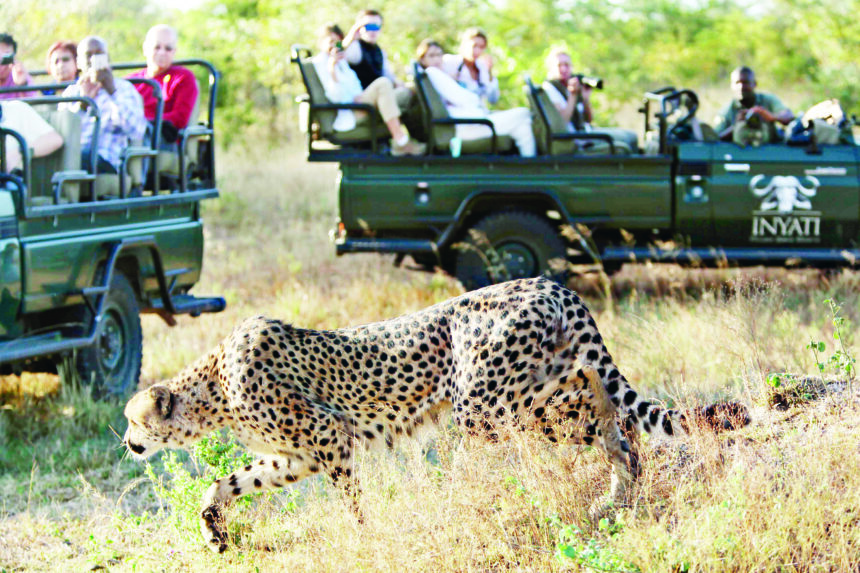JOHANNESBURG – International hunting is coming soon to the wilderness areas outside the Kruger National Park, where herds of elephants overpopulating the park ‘spill over’, and roam daily.
They roam with other wildlife such as lions, buffaloes and crocodiles.
A leader of South Africa’s Kruger National Park, Sydney Shibambu, which neighbours the Makuleke community, said they always hear about international hunting’s significant socio-economic and conservation benefits almost everywhere in Southern Africa.
“We now want to start international hunting in our community in order to enjoy its life-changing benefits,” he said.
“As a community, our position is that we need to look after our natural resources, including wildlife. That wildlife also needs to look after us through international hunting,” he said.
He noted that the Makuleke Communal Property Association is ready to run an international hunting business, working together with safari hunting companies.
“If the people of Makuleke want international hunting, there is nothing wrong with that,” said Lamson Maluleke, a technical advisor to the Makuleke Communal Property Association, with many years of experience in community conservation and developmental work.
“If they want to benefit from international hunting, I will be the first one to support them.”
The South African government permits international hunting.
Photographic safaris and lodge businesses were the Makuleke community’s first taste of benefits from natural resources.
The community boasts of two upmarket lodges built in the late 1990s, with one of them enjoying a record-breaking customer attraction that saw it being fully booked while its foundation was being laid.
Notably, the Makuleke community’s love for natural resources conservation (including wildlife) was shown by its opting not to settle on the land (Pafuri Triangle) inside the Kruger National Park from where their ancestors were forcibly removed in 1969, but reclaimed it in the late 1990s in post-independence South Africa.
Instead of using their reclaimed land for permanent human settlements and agricultural activities, they chose to use it for photographic tourism and lodge businesses.
However, they continue to hear that other Southern African communities co-existing with wildlife are benefitting from both photographic tourism and lodge business, including international hunting that comparatively generates more revenue.
They also learnt with great interest that a busload of photographic tourists staying in a lodge for two weeks brings less income than income generated by a single international hunter coming to hunt and stay for the same period.
Besides bringing comparatively more money to a hunting community, the single international hunter also has a comparatively far less impact on the environment.
In contrast, the busload tourists have a far greater impact on the environment, and bring far less income than that which is brought by a single international hunter.
Over the years, the Makuleke community leaders and residents have been continuously bombarded with international hunting benefits information, including at a recent workshop in the Limpopo Province.
They have now decided that it is high time that they started enjoying the same international hunting benefits being enjoyed by their counterparts from countries like Botswana, where hunting communities generate multi-million pulas annually from international hunting, and use the income to support community conservation and developmental initiatives.
Elsewhere, in Southern Africa, their Zimbabwean counterparts recently told them that hunted crocodiles, elephants, baboons, monkeys, leopards, buffaloes and lions are sending their children to school, and then to university, where they graduate and lift themselves and their families out of poverty.
The schools that are funded by hunting revenue have produced graduates in finance, medicine, nursing, teaching and
engineering.
Some of these university graduates have already been poached by Western countries, such as the United Kingdom, which ironically continues to oppose international hunting.
Elsewhere, Botswana and Namibian hunting communities recently issued powerful international hunting industry endorsement statements.
“Wildlife hunting revenue has built a four-star lodge and community store, created employment and made us see the need to conserve not only wildlife but also its habitat,” said Claudia Nchunga of Botswana’s wildlife-rich Chobe district.
“Therefore, hunting is promoting conservation and development in our community.”
In a Namibian hunting community, wildlife impressively ‘argued’ that it has greater value than cattle production, and won.
“If you sell one cow, you get US$125 (N$2 000), while a kudu fetches US$935 (N$15 000) or more, depending on the size,” said Anabeb Conservancy chairman Ovehi Kasaona in a recent interview.
“Therefore, our conservancy decided last year to sell all our cattle, and use the land for wildlife hunting and tourism lodges that we have built using hunting revenue.”
The hunting benefits to Namibia’s Anabeb Conservancy include the provision of water “within a five-metre distance for each household”.
This has drastically reduced the long distances women and children would walk every day in the past to fetch water in the punishingly dry landscape.
*Emmanuel Koro is a Johannesburg-based international award-winning independent environmental journalist, who writes on environmental and developmental issues in Africa.


